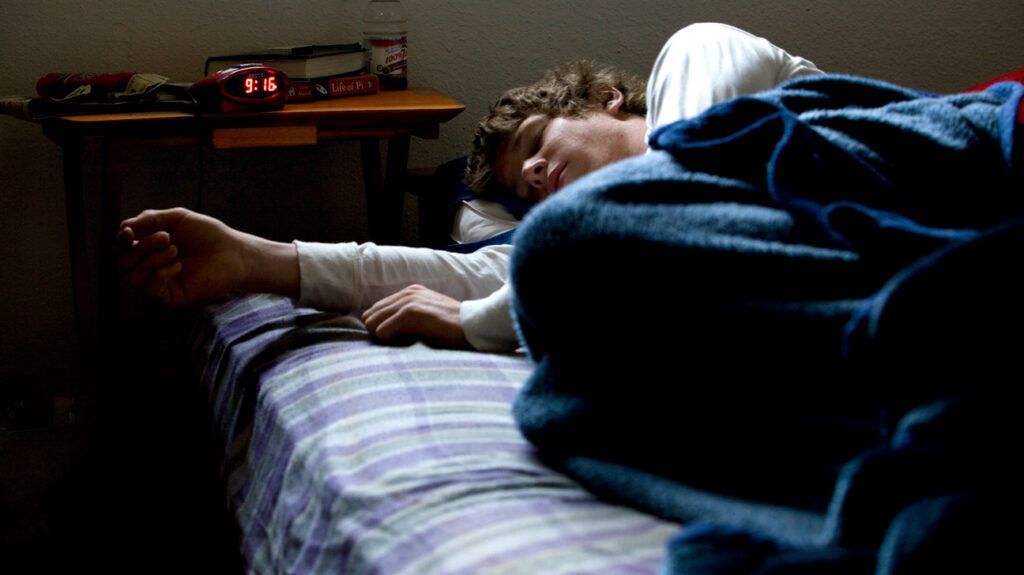Sleep paralysis — feeling awake but being unable to move — can be a scary experience for some, but managing it is possible.

Falling asleep and waking up aren’t usually memorable parts of your night. When you have uneventful quality sleep, you probably don’t recall those in-between moments of sleep transition.
But when you experience sleep paralysis, these are the stages of sleep you may begin to dread the most.
Instead of drifting peacefully in and out of sleep, you might have a feeling of being conscious but unable to move, locked into place.
In some cases, you may feel as though you aren’t alone — a part of what can make sleep paralysis a distressing experience.
A certain type of paralysis occurs as a natural part of the sleep process.
During rapid eye movement (REM) sleep, your body induces a state of extreme muscle relaxation that prevents you from acting out your dreams or moving wildly when you’re not awake.
This state of paralysis is known as REM atonia, and it’s an important bodily function.
Sleep paralysis is a disorder of REM sleep that can occur alongside other medical conditions or independently as isolated sleep paralysis.
It’s considered a parasomnia — an out-of-the-ordinary, undesirable experience that disrupts your sleep.
During an episode of sleep paralysis, you may feel like you’re conscious but are unable to move while entering or waking from slumber.
Is sleep paralysis dangerous?
Sleep paralysis is not considered physically harmful or dangerous, though it may be an extremely distressing and terrifying experience.
It can occur alongside other medical conditions that have long-term effects, such as:
Sleep paralysis can happen to anyone. You might experience it regularly, or it may only happen once in your lifetime.
Symptoms can vary but often include:
- a feeling of being conscious but unable to move while falling asleep or waking up
- visual hallucinations of intruders, supernatural entities, or physical attack
- hallucinations involving smell or sound
- a sense of a dangerous presence in the room
- pressure on the throat or a feeling of suffocation
- breathlessness or irregular breathing
- feelings of anxiety or fear
- daytime sleepiness
- sleep deprivation
- fragmented sleep
The exact cause of sleep paralysis isn’t clear, but data from a
Sleep paralysis is often associated with other medical conditions and may be seen more commonly in people living with a mental health condition, particularly panic disorder.
A common sleep paralysis theory suggests it occurs when there’s an unusual overlap in sleep-wake cycles.
Possible contributing factors of this may include:
- poor sleep quality or duration
- sleeping on your back
- elevated anxiety levels
- personality predispositions, such as a belief in the supernatural, dissociation, or imaginativeness
- alcohol use
- exposure to trauma
- genetics
- medications
- sleep-related leg cramps
Other theories
The bodily processes that create sleep paralysis are still being investigated.
According to
Researchers
Sleep paralysis has been associated with a number of other medical conditions, including:
- hypertension
- migraine
- narcolepsy
- obstructive sleep apnea (OSA)
- Wilson’s disease
- substance use disorder (SUD)
- insufficient sleep syndrome
- bipolar disorder
- hypersomnia
- exploding head syndrome
- post-traumatic stress disorder (PTSD)
- panic disorder
- generalized anxiety disorder
- social anxiety disorder
- specific phobia, namely death anxiety
Sleep paralysis won’t cause you physical harm, but it can be uncomfortable and disturbing to experience. Prevention and management are possible.
Addressing underlying medical conditions may help diminish sleep paralysis episodes.
Due to the potential link between sleep paralysis and poor sleep quality and duration, you may also benefit by improving your sleep with sleep hygiene practices, such as:
- avoiding electronic devices before bed
- maintaining a consistent sleep schedule (so waking up and going to sleep at the same time)
- avoiding large meals or stimulants before bedtime
- keeping your bedroom cool, dark, and quiet
- only using your bed for sleeping and intimacy
- exercising, but not right before bed
- cultivating a pre-bed relaxation routine
- avoiding daytime napping if possible
- getting up and doing a quiet activity instead of laying in bed if you can’t fall asleep
If you’re concerned that stress and anxiety may be contributing to sleep paralysis, speaking with a mental healthcare professional can help you develop beneficial skills to manage.
Sleep paralysis can come with a distressing feeling of being conscious but unable to move. It may be a once-in-a-lifetime moment or a regular experience for some.
While it’s often an event that creates intense fear and anxiety, sleep paralysis itself isn’t considered dangerous.
Preventing sleep paralysis is possible. It typically begins with addressing possible underlying causes.
Certain factors can play a role in causing sleep paralysis, including:
- poor sleep quality
- chronic physical health conditions
- mental health conditions
If you’ve experienced this REM parasomnia, speaking with a medical professional can be an excellent first step in finding relief.
